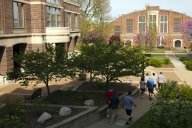You have /5 articles left.
Sign up for a free account or log in.
A regional director of the National Labor Relations Board ruled Friday that resident advisers at George Washington University have the right to unionize. The ruling could apply to other private colleges and universities, potentially opening a new part of private higher education to unions.
At the same time, the ruling could open the door to legal fights that could block the union. Friday's decision orders an election at GW. But if the RAs at the university vote to unionize, GW could challenge the ruling, and it has indicated that it may do so. Many higher education groups are also lining up to oppose unionization. (Collective bargaining rights of resident advisers and other employees at public institutions are governed by state law and will not be changed by whatever the outcome in this case.)
The ultimate outcome could depend on how soon President Trump has openings to fill on the NLRB, whose members serve staggered terms that do not end automatically with a new president. The current board has a majority sympathetic to unions, but that is unlikely to be the case with more Republican appointees.
The decision in the GW case was based largely on an NLRB board decision last year that said that teaching assistants at private universities could unionize. In that case, based on a union drive at Columbia University, unions argued that the TAs were employees, while universities said the TAs should be seen primarily as students who should not be entitled to collective bargaining. The NLRB ruling said that TAs were both students and employees and that they were entitled to unionize.
The regional director who heard the GW case, Sean R. Marshall, wrote in his decision that he looked at the definition of "employee" in the teaching assistant case and found three criteria. Employees, he wrote, "(1) perform services for the employer; (2) are subject to the employer’s control; and (3) perform these services in return for payment."
And Marshall then outlined how RAs meet all of those tests. They are paid (both a stipend and in the form of free housing) and they must follow specific rules.
Further, he rejected GW's argument that the undergraduates who work as RAs "reside in the university’s residence halls in order to have an informal, peer-to-peer mentoring relationship with, and serve as role models for, their fellow undergraduate students.”
"The employer’s characterization of the RAs’ duties tellingly omits any explanation about why these duties are performed by RAs, and why undergraduate students serve as RAs," Marshall wrote. "Plainly, the RAs are not providing these services voluntarily -- the RAs unquestionably receive something of value in exchange for their services. Further, since there is no suggestion that RAs receive academic credit in exchange for serving as RAs, I find no basis to conclude they provide these services as part of their educational relationship with the employer. Rather, I find that the RAs provide these services based on an economic relationship with the employer -- the RAs exchange services desired by the employer in return for compensation from the employer and desired by the RAs."
Marshall added that just because RAs may value their experiences for reasons beyond compensation that doesn't mean they aren't employees. "I do not doubt that when current and former RAs reflect on the time they spent as RAs, they believe the experience was educational and was instrumental in their future career accomplishments," he wrote. "However, the same can be said for many of one’s life experiences, whether they are educational, social, religious or occupational. Employment experiences can simultaneously be educational or part of one’s personal development, yet they nonetheless retain an indispensable economic core. Here, the evidence shows, and no party contends otherwise, that an economic exchange between the RAs and the employer is the sine qua non of their relationship."
GW released this statement Friday: "While the university will continue to cooperate with the NLRB in this process, the university continues to believe that the NLRB’s union election process should not be applied to students in our residential life program, which is an integral part of the educational experience of our undergraduate students. We will continue to share our views with resident advisers as this process moves forward."
Steven M. Bloom, director of government relations at the American Council on Education, said via email of the decision, "A regional office administrator deciding to let undergraduate resident advisers unionize is a major and unprecedented change in federal labor law. This really is a bureaucracy run amok. This represents the kind of step that we feared after the Columbia decision, which opened the door to this deeply troubling extension of federal labor law to undergraduates. We hope a future NLRB overturns this decision."
ACE and other higher education groups filed a brief with the NLRB opposing the union drive.
Service Employees International Union is the group seeking to organize RAs at GW. SEIU has had success of late in higher education organizing non-tenure-track faculty members.
GW students who are among the RAs seeking a union wrote an op-ed last year in The GW Hatchet, the student newspaper, outlining why they want a union. They said that some contract terms are ambiguous, and that they consider others unfair. Further, since anyone fired as an RA loses housing and a stipend, the consequences are serious, they wrote. These are the kinds of issues, they wrote, on which a union could help.
"We look forward to embracing our rights under federal law to democratically bargain with our employer," the op-ed said. "Ultimately, we look forward to coming to the table … to negotiate a contract that will allow us to continue to better the student experience."








